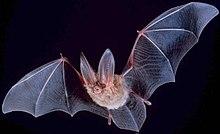This week, a six-year-old boy tragically died after contracting rabies. He will be counted as one of only a handful of rabies deaths in the United States each year. As a side note, rabies kills about 60,000 people a year, worldwide.
The comments sections on the articles regarding his death are chock full of condemnation for the parents.
But, not everyone knows what to do after coming into contact with a bat. And, it's not just these parents who did not understand. Almost every day, I see people feeding the raccoons in Central Park out of their hands. That is an accident waiting to happen.
So, instead of making these parents, who I can imagine already feel badly enough, feel worse, and try to assure this does not happen again, we need to talk about what to do if you happen to come into contact with an animal that may be rabid. Because, as scary as rabies is - dying from it is preventable.
First of all - what classifies as an animal that could be rabid? That is tricky because any mammal can carry rabies. But, the most common carriers and transmitters are bats, skunks, raccoons, dogs, cats, coyotes, and foxes. If you do come into contact with one of those animals (or other animals that are acting strangely), what should you do?
The short answer (this is taken from the Centers for Disease Control (CDC) website) is to
- Clean the wound
- See a doctor immediately
In fact, immediately cannot be stressed enough here. More on that later.
The medical professional will determine if the person should be vaccinated or not. And, in the vast majority of cases, the vaccination will be given. Why? Because rabies has an almost 100% fatality rate, the injections may be uncomfortable but have no significant risk; and no one wants to play those odds. So, they'll give the shots just to be on the safe side, which makes sense.
In fact, I know someone whose entire family received the vaccine because they had a bat in their house. Was the bat rabid? No idea. Were they bitten? Not that they knew. But, because some bat bites cannot be felt (the bat was in their house overnight, and a bat bite would not necessarily wake someone from their sleep) they got the vaccine just to be sure.
What shots does a person receive after potential rabies exposure?
There are two components to the injections. The first is the vaccine - a part of the rabies virus that will, over time, build up immunity in the person. It is given in four doses - one right away with additional doses on the 3rd, 7th, and 14th days.
But, it takes time to build up the immunity, and someone infected with rabies has no time to waste because the rabies virus is already in the body multiplying. Once the virus infects the neurons and symptoms develop, death is almost inevitable.
To treat rabies immediately, the patient receives an additional shot of immunoglobulins - a bolus of proteins. They will bind to the virus and activate the immune system to rid the body of the virus. The large dose of immunoglobulins given at the time of exposure will begin to work immediately.
It's crucial to not wait because once symptoms develop the shots no longer work. And the time of exposure to symptoms varies from person to person. So, even if you think that you may have been exposed to rabies, go to see your doctor and get the rabies vaccine.
Because if you get the vaccine and you didn't have rabies - there is no harm done. But, if you don't get it and you do have rabies, you will die.
For more information on Rabies, please read Rabies Information You Can Sink Your Teeth Into.




